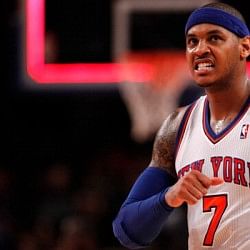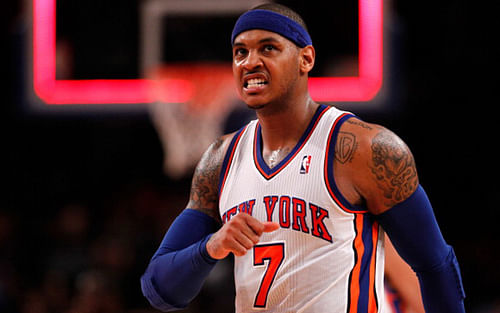
The Melo effect: Is Carmelo Anthony really the superstar that he is made out to be?

There is a hush in the Big Apple these days. It’s not like the New York Knicks were the best team in the NBA, but when your team goes from championship caliber play to downright shambles in the space of a single off-season it is bound to raise a few eye-brows. Few, in this case, because ineptitude is as synonymous with the New York Knicks as scoring was with Wilt Chamberlain. It is almost as if the Knicks play well, then wake up from their stupor and realize what they are doing is too good to be true and screw it up all over again. This season, however, even the performances that make the Knicks resemble at least as a competent NBA team and not its D-league affiliate, have been few and far in between.
The Knicks have a history of dysfunctional and self-sabotaging decisions, which may well be the subject of a new article altogether. This article however is supposed to focus on Carmelo Anthony. Analyzing a player without analyzing his franchise may not be a logical decision, but doing so in a single article given the Knicks’ record of idiosyncrasies will put an unnecessary amount of strain on the concept of a word count.
Carmelo Anthony was drafted as the 3rd overall pick in the 2003 NBA draft, the draft which featured LeBron James, Dwyane Wade and Chris Bosh among others. Anthony and James were locked up in the debate for the No.1 draft pick for the duration of the season until LeBron got picked first by the Cleveland Cavaliers.
Billed as an immediate superstar and a franchise player right from draft day, Anthony arrived in Denver with a humongous amount of expectations for a rookie. Denver was a middling NBA franchise with a small market and floundering attendance numbers. Anthony was immediately thrust into the franchise player role, a role very few had donned in the Nuggets’ history.
Now Carmelo Anthony was always talented and all his scouting reports said nothing to the contrary. An immensely proficient scorer, with an exceptional mid-range game, he had a knack for scoring points and that is pretty much all the NBA scouts are looking for from young players making the leap from prep to pros. He joined the Nuggets as a member of a lottery team coming off a 17-65 record and immediately repaid the faith by leading them to a 43-39 record. The Nuggets kept improving throughout Anthony’s tenure with the Nuggets, posting a better winning percentage almost each year right up until his subsequent trade to the Knicks.
That is supposed to be a win-win situation for any team which is a mediocre franchise; continuous improvement. But if you acquire a franchise player, regular season ceases to matter. The team’s success is gauged by the post season performance, something that has historically been lacking in both the NBA teams that Anthony has been a part of.
Take the Nuggets for example – right from Anthony’s first season to his trade in 2011, the Nuggets got eliminated in the first round of the Western Conference in every season except 2008-2009, where they were eventually schooled by the Lakers. That is not supposed to happen when you have a Top-5 player playing on your team. Superstars win matches, particularly the playoff ones. Anthony always seemed to fall a bit short every season. The Nuggets were competent and consistent enough to post a winning record and a good seed every year, but somehow could never muster enough gas to win when it mattered.
Although Anthony cannot be blamed completely for the Nuggets failing to advance past the first round, it did point out a few glaring weaknesses in his game, weaknesses that still exist. Anthony is and always will be one of the best scorers in the league. He is routinely among the top 3 in points scored per game which means that he can do the most important task in a basketball game well and better than 90% of the league. But Anthony is a liability on defense, slow on rotations and taking unnecessary gambles while guarding opposition players.
Defensive lapses can be ignored to an extent. Not everyone can be Scottie Pippen on the defensive end, much less a player like ‘Melo, but there is a precedent that needs to be set when it comes to the effort your star player is giving on the floor, and if he does not play hard enough then the rest of the team simply runs out of juice. That was the difference between all the Bulls teams of the Michael Jordan era and the others, because on any given night, if Michael Jordan was on the floor you could be sure that he would be playing the hardest whether the Bulls were down by 10 or up.
Such kind of halfhearted efforts may go unnoticed in the regular season but when it comes to the playoffs, such mistakes can well be the difference between a one point win and a one point loss. Also Anthony has always been a volume scorer. He routinely puts up close to 20 shots a game, sometimes above 30. Now in an average NBA game with up to 90 possessions, if 33% of your possessions are being used by a single player, it leads to a stagnant offense, non-existent ball rotation and heavy isolation plays all of which are equal to inefficient basketball.